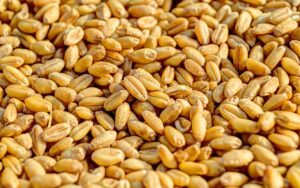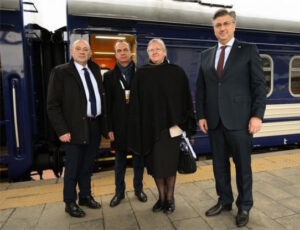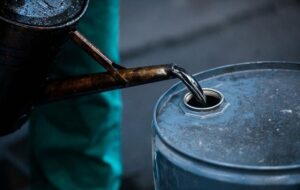
Leaders of five Central and Eastern European countries have urged the European Commission to take action in connection with a surplus of grain and other Ukrainian food on their territory, the Associated Press reported from Warsaw.
“We call on the European Commission to study the possibility of buying accumulated grain from EU member states bordering Ukraine for humanitarian needs,” reads a letter addressed to EC President Ursula von der Leyen on behalf of the prime ministers of Poland, Slovakia, Hungary, Romania and Bulgaria.
“We also reiterate our call for financial support from the EU to accelerate the development of transport infrastructure (for the export of grain – IF),” it says.
It is pointed out that such products remain on the shelves of these countries in excess, reducing prices, and do not reach the countries that are ready to buy them outside the EU.
The European Commission earlier said that it intended to quickly launch an assistance mechanism for countries that faced an influx of Ukrainian products.

Slovak Prime Minister Eduard Heger, Croatian Prime Minister Andrej Plenković and Slovenian Prime Minister Robert Golob have arrived in Kiev, where they will participate in a summit to mark the anniversary of the liberation of Buča. Slovak Prime Minister Heger arrived in Ukraine on Friday and will meet with President Vladimir Zelenski, the Slovakian news agency TASR reported.
Along with Heger, Slovak Defense Minister Jaroslav Nagy arrived in Ukraine. The time and place of the meeting are not disclosed in advance for security reasons.
According to Heger, Zelenski invited him to visit Ukraine in a telephone conversation after Slovakia approved the transfer of MiG-29 fighter jets to Ukraine.
For his part, Nagy is scheduled to meet with his Ukrainian counterpart Alexey Reznikov during the day.
In addition, Croatian Prime Minister Andrej Plenkovic arrived in Kyiv on Friday morning. He is scheduled to meet with Zelensky, Prime Minister Denis Shmygal and Chairman of the Verkhovna Rada Ruslan Stefanchuk. Also with the Croatian prime minister arrived Minister of Veterans Affairs Tomo Medved.
According to the Croatian government’s website, together with Zelenski, Heger, Golob and Moldovan President Maia Sandu, they will take part in a summit on “Bucha – Russian Responsibility for Crimes in Ukraine” in Kiev to mark the anniversary of the liberation of Bucha (Kiev region). A joint press conference will follow.
This is Plenkovic’s second visit to Ukraine since the Russian aggression began on February 24, 2022. Last May, he met with the Ukrainian leadership in Kiev and visited Irpen and Bucha.
The Slovenian newspaper Delo, for its part, reported on the arrival of Slovenian Prime Minister Robert Golob in Kiev on Friday. He also intends to meet with Zelenskyy.
For the Slovenian prime minister, this is his first visit to Ukraine since coming to power. His goal is to reaffirm his support for Ukraine, which has been a victim of Russian aggression since last February.
Golob will also be received by Shmygal and Stefančuk .

The ninth package of EU sanctions against Russia adopted on Friday allows Bulgaria, Hungary and Slovakia, which received a reprieve from the European Union’s oil embargo on Russian oil, to export oil products produced from it to Ukraine.
The EU Council resolution published in the EU Official Journal on December 16 says the decision “allows Hungary, Slovakia and Bulgaria to export to Ukraine certain refined products derived from Russian crude oil imported on the basis of the considered derogations (from the embargo – IF), including, if necessary, by transit through other member states.”
Another paragraph of the ruling allows Bulgaria to “export to third countries certain petroleum products derived from Russian crude oil imported on the basis of the derogations under consideration.
The publication attributes this to the need to “reduce environmental and safety risks, as such products cannot be safely stored in Bulgaria.
The document specifies that the respective annual exports should not exceed the average annual volume of exports of such products for the last five years.

Slovakia is ready, but has not yet sent MiG-29 fighters to Ukraine, this issue was discussed in detail with Ukrainian President Vladimir Zelensky, said Slovak Foreign Minister Rastislav Kacher.
“We have not yet handed over the MIG-29s to you. But we are ready to do it. We are talking with our partners in NATO about how to do it. And today (Dec. 8) we had a very informative conversation with your president. My secretary of defense explained to your president how we can do this. And I think that in the coming weeks a Ukrainian delegation will come to Slovakia, and we will work together with our American friends to make this a reality,” Kacher told Interfax-Ukraine.
The foreign minister noted that on December 7 Slovakia approved “a couple of thousand missiles that are used for the MIG-29.” He also said that he discussed the issue of sending the planes with the president of Ukraine during a meeting.
“But we also discussed it at some length with President Zelensky, too. And I think I need to keep it a secret how it’s going to be done so as not to jeopardize it. But I will say that we had a very, very good exchange with President Zelensky today about how we’re going to do this. So I’m very optimistic, I think it will be done soon too, the planes will appear in Ukraine,” Kacher added.

More than EUR66 million will be allocated under the first Interreg NEXT European cross-border cooperation program for Hungary, Slovakia and Romania’s partnership with Ukraine in health, environment and good governance, the European Commission (EC) announced Friday. “This program is part of the EU’s overall support and unwavering solidarity toward Ukraine. By implementing a cohesion policy, Interreg will help Ukraine and its bordering member states to face common challenges and seize joint opportunities,” said Elisa Ferreira, EC member for cohesion policy and reforms.
The program covers the period of 2021-2027. Hungary, Slovakia, Romania and Ukraine are expected to work together to ensure equal access to health services and improve the sustainability of their health systems.
The program will support climate change adaptation and disaster risk prevention solutions. The participating countries will cooperate to protect nature, develop “green infrastructure” and tourism.
It is also a question of aligning Ukraine’s norms with EU member states in the area of effective public administration. Relevant projects will promote legal and administrative cooperation to remove common barriers to interaction in border areas, while supporting cooperation between citizens, civil societies and state institutions, according to a communiqué from the European Commission.
CROSS-BORDER COOPERATION, HUNGARY, ROMANIA, SLOVAKIA, UKRAINE

A Ukrainian transport company reacted positively to the proposal of Slovnaft and MOL to pay transit fees for transporting oil through the southern branch of the Druzhba oil pipeline, the Slovak company said.
“Slovnaft has already made a payment to the company’s account. Based on this, Slovnaft expects the resumption of oil supplies in the coming days. The Russian side also agreed with this decision,” the company stressed.
According to Bloomberg, the Hungarian MOL also transferred the transit payment and expects to resume deliveries in the coming days.
Earlier, Transneft reported that on August 4, Ukrtransnafta stopped the transit of Russian oil through Ukraine due to a failure to pay the transit fee. It was noted that the funds sent on July 22 for transit in August were returned to the account of Transneft on July 28 in connection with the entry into force of EU Regulation 2022/1269. Through the southern branch of the Druzhba oil pipeline passing through the territory of Ukraine, oil supplies are carried out in the direction of the refineries of Hungary, Slovakia and the Czech Republic on the basis of a long-term agreement between PJSC Transneft and JSC Ukrtransnafta for the provision of oil transportation services on the terms of 100% prepayment.
The Hungarian MOL and the Slovak Slovnaft (also part of the MOL group) initiated discussions with the Ukrainian and Russian sides on the possibility of paying a transit fee to MOL or Slovnaft, which would allow oil supplies to be restored.
“The interruption of supplies occurred after technical problems at the bank level due to the payment of transit fees from the Russian side. However, production at the Bratislava refinery is running smoothly, and deliveries to the market are smooth. During this period, the Bratislava refinery is in close cooperation with the national oil transporter Transpetrol, as well as in cooperation with the Slovak Ministry of Economy, uses all the reserves available in the system for processing,” Slovnaft said.
So far, there have been no reports of a solution to the problem of transit to the Czech Republic.
Last year, 12 million tons of Russian oil was transported through Druzhba through Ukraine, including 3.4 million tons to the Czech Republic, 5.2 million tons to Slovakia, and 3.4 million tons to Hungary.